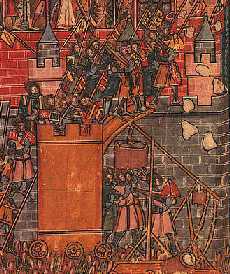
A Viking ship like the ones that sailed on the First Crusade
Before the First Crusade
Throughout the 1000s AD, Viking mercenary soldiers, some coming down the Volga river through Russia, and others sailing around through the Straits of Gibraltar, had been fighting for the Byzantine Empire.
What are mercenary soldiers?
Who were the Vikings?
The Byzantine Empire
All our medieval Europe articles
The Abbasids and Fatimids were weak
Many of these men fought along the Mediterranean coast of West Asia, so they knew that this was a very rich area, and that the Abbasid and Fatimid governments were weak and would not be able to defend themselves against a strong attack.
Who were the Abbasids?
The Fatimids in Egypt
All our medieval Islam articles
The Normans were strong
And once the Normans had settled in France and conquered England, both France and England, and also the Holy Roman Empire, were stronger than they had been since the time of Charlemagne.
Who were the Normans?
England under the Normans
Capetians in France
So the Europeans decided to attack
Their kings and queens began to think that an attack on Jerusalem would be easy, religiously good, and extremely profitable. Jerusalem was the city of Jesus Christ, so surely God wanted Christians to take it back from the Islamic Fatimids who were ruling it?

Clermont
History of Christianity
Pope Urban makes a speech
In 1095 AD Pope Urban made a great speech at Clermont (CLAIRE-mant) in southern France, where he urged the people to take up weapons and go fight to free Jerusalem from Islam. People were wildly enthusiastic. Even children and old women and old men wanted to go.
People were enthusiastic
People were so enthusiastic that several groups set off for Jerusalem before the main group was organized. They believed that God would just knock down the walls of Jerusalem anyway as soon as they got there, so there was no need for fighting or weapons. Some of them didn’t even take any money.
They attacked the Jews on the way
Most of these groups found that traveling and fighting were harder than they had imagined, and most of them died on the way. One group decided it was too hard to get to Jerusalem to fight the Fatimids, and instead stopped in Germany to fight the Jews. Thousands of Jews were robbed and killed by these Crusaders, just because they were not Christians.
Jews in Medieval Europe

Dome of the Rock mosque, Jerusalem
The main Crusaders head out
Finally in the fall of 1096 the main Crusade – with actual Norman soldiers – left for Jerusalem. They went by different routes, some by land and some by sea, to Constantinople.
They reach Constantinople
Here the Emperor Alexius was quite surprised to see them and not altogether pleased. He had recently had to fight Viking mercenaries in what is now Turkey, after the Battle of Manzikert in 1071.
What’s the Battle of Manzikert?
But Alexius also thought, “Maybe these Crusaders will conquer the Eastern Mediterranean and then make it part of my empire!” so he sent them as fast as he could on towards Jerusalem.
Fatimids don’t see the danger

The Crusaders taking Jerusalem
The Fatimids were still not worried, because they thought this was just a little army of Roman soldiers from Constantinople, who just wanted to fight a little in Syria.
Crusaders in Jerusalem
The Crusaders finally reached Jerusalem in May, 1098. They enjoyed all the civilized things in the city of Jerusalem – the Dome of the Rock, and hot baths, and advanced Islamic medicine.
Dome of the Rock
Islamic medicine
The Crusaders made many mistakes in their fighting. But the Fatimids were also fighting with the Seljuks, so they didn’t defend Jerusalem very well. The Crusaders captured Jerusalem, as well as some other important cities along the Mediterranean coast (and most of southern Italy).
Crusaders as kings of Jerusalem
They settled down there as the kings of Jerusalem, in their own new country, and some people got very rich. Many Europeans travelled back and forth, learning about math and medicine from Islamic scholars, and bringing back new foods like sugar and bitter oranges to Europe. So the First Crusade was a big success for the Europeans, and a setback for the Fatimids.
Learn by doing: eat some marmalade made with sugar and bitter oranges
Second Crusade
Bibliography and further reading about the Crusades: